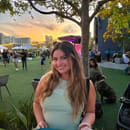One of the most comforting aspects of reading is that feeling of unmistakable relatability to something an author has written. Emily Henry is a flourishing romance novelist — and undoubtedly one of my favorite authors — who has managed to evoke this special feeling from much of her readership.
I’m one of many young women who have picked up an Emily Henry book and expected it to go into a fluffy and mindless romantic read. What you get instead of “just a romance” is a thoughtful representation of what it looks like and feels like to be a woman in your twenties.
Henry’s female protagonists all grapple with various struggles and self-discoveries that resonate deeply with her audience of young women. In Beach Read, January battles with grief and embarks on a healing journey. In Book Lovers, Nora explores self-acceptance and familial love. In Happy Place (my personal favorite), Harriet learns how to grow into adulthood with the people she loves. Each of these protagonists presents her own issues that bring an emotional depth to Henry’s stories.
She uniquely encapsulates the female experience by providing a dual narrative that blends romance and literary fiction. She achieves this blend by seamlessly weaving deeper themes into lighthearted and romantic moments, creating a well-rounded novel. Her novels are not in your face, “Hey, these are all the depressing reasons why being a girl is so hard!” kind of reads, but a more reassuring, “You aren’t alone, and I promise you’ll be okay,” kind of read.
For young women like myself who are transitioning into adulthood, it’s encouraging to see female experiences and emotions being reflected through these strong fictional women. Not everyone has a trustworthy support system they can lean on when it comes to the unique dilemmas that young women encounter, so getting into Henry’s novels and women’s fiction, in general, can be an enjoyable way to feel seen and supported in the transitional stage that is your twenties.
To me, Emily Henry can do no wrong. But she still may not be everyone’s cup of tea! In an interview last year for TODAY, Henry expressed that her novels come from a personal standpoint, which means that her stories only offer one particular perspective. Abby Jimenez, Bolu Babalola, Tia Williams, Kiley Reid, Casey McQuinston, and Morgan Rodgers are all female authors who similarly write romance stories (that are much more than just romance stories) but offer representation to a broader group of women.
If reading is new to you, or romance and women’s fiction is new to you, I suggest you allow Emily Henry novels to be your gateway. And if you’re a seasonal reader like myself, the season of love and springtime weather is the most fitting time to immerse yourself in her touching and joyful stories.
Henry will return on April 23 with a new release titled Funny Story, which she describes in her newsletter as her “personal breath of fresh air. To quote the great American poet, Taylor Alison Swift, it was the breeze in my hair on the weekend.“
There has been a shared negative attitude surrounding works of art that bring women joy or comfort. Henry’s work, along with the work of many other talented romance authors, has been previously cast aside as silly or meaningless (which by the way, there is absolutely nothing wrong with this kind of romance!) when in reality, these works have achieved so much more.
We see this criticism not only in the literary realm but also in the musical realm with female artists such as Taylor Swift and Beyoncé. If there is one thing that female artists do well, it’s that they represent what it feels like to be a woman — and this isn’t a representation that should be cast aside.
Henry expresses her insight into how women’s fiction is overlooked through the frustrations of her character, January Andrews, in Beach Read. January is a romance author, and while in conversation with a male author, she gives him a piece of her mind:
“I know how to tell a story, Gus, and I know how to string a sentence together. If you swapped out all my Jessicas for Johns, do you know what you’d get? Fiction. Just fiction. Ready and willing to be read by anyone, but somehow by being a woman who writes about women, I’ve eliminated half the Earth’s population from my potential readers, and you know what? I don’t feel ashamed of that. I feel pissed. That people like you will assume my books couldn’t possibly be worth your time, while meanwhile, you could shart on live TV and The New York Times would praise your bold display of humanity.”
As January Andrews so eloquently states, the consumption of art created by women and for women is precious. The next time you browse the romance or women’s fiction section of a bookstore, think about how you could benefit from a female-driven narrative and consider trying Emily Henry’s books!
Want to see more HCFSU? Be sure to like us on Facebook and follow us on Instagram, Twitter, TikTok, and Pinterest!


